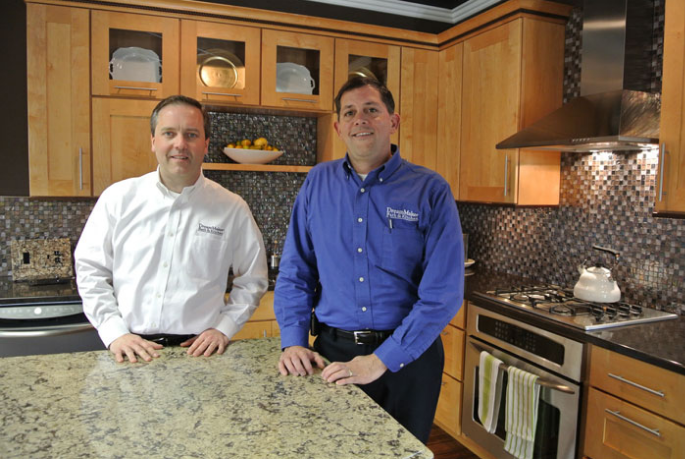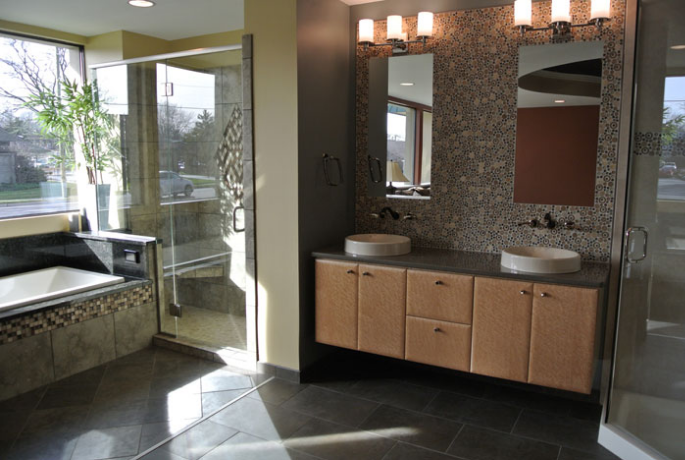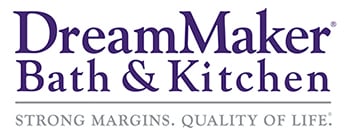Lee Willwerth, co-owner of DreamMaker Bath & Kitchen of Ann Arbor, MI, offers a DreamMaker franchise review
 Lee Willwerth and Bob Ender inside their DreamMaker Bath & Kitchen Design Center in Ann Arbor, MI.
Lee Willwerth and Bob Ender inside their DreamMaker Bath & Kitchen Design Center in Ann Arbor, MI.
Lee Willwerth and Bob Ender have earned national recognition for excellence thanks to the work of the DreamMaker Bath & Kitchen franchise in Ann Arbor, MI. But before they became remodelers, they were software engineers and auto industry veterans.
Lee recently spoke with us about his journey to DreamMaker, what attracted him to the company and how it has helped him, Bob and their wives, Brenda and Jennifer, build a strong and growing business.
What were you doing before DreamMaker?
I have a varied background. My degree is in physics, and after graduation I spent about six years in the auto industry in Detroit and moved into engineering software while there. For eight years I had my own software company. We made custom software to help the engineering departments of different manufacturers. For instance, natural gas companies need to create custom equipment for different wells, and a lot of calculations go into building the right tool for the specific situation. We would work with their engineers and study the spreadsheets and other calculations they were using in their design process, then would build software to help make their design process much faster.
Why did you want to change?
After the dot-com bubble burst in 2001, my business dried up. I closed the company. I started looking for something that would keep me closer to home. I didn’t want to travel; I wanted to be back home for dinner every night. I decided to start refurbishing homes and selling them. I had done construction with my father as a hobby while growing up; I grew up building with him. He was a professional musician — he played the trumpet — and also taught music. During the summers, when he wasn’t teaching, he liked to build houses and sell them. From the time I was 11, I learned to run plumbing and hang siding. Even though I had never been a professional builder, all the skills were there. What I lacked was knowledge of how the industry does things.
How did you meet Bob?
We’re neighbors, and we met through our wives (Brenda Willwerth and Jennifer Ender). He was also in the auto industry and did software, and he had a construction background.
How did you get into remodeling?
When you are refurbishing and selling houses, it doesn’t take long before people start asking you for help with remodeling, and we started doing kitchens and basements. We eventually focused on remodeling because the economy was starting to slide in Michigan, and we realized that refurbishing homes to flip might not be the best investment at the time.
How did you find out about DreamMaker?
In 2004, Bob and I went to a remodeling trade show in Chicago and found the company exhibiting there. We were there looking for cool tools, not a franchise! We saw the DreamMaker booth and were curious, because we couldn’t tell what they were selling, and when I paused, I was greeted and invited into a conversation. I had a chance to meet Doug (Dwyer, DreamMaker president), and we thought the idea was interesting. After a few weeks of conversations, it became clear that this was something we should seriously consider. The rest is history.
What attracted you to DreamMaker and what do you like about it?
I knew that remodeling was a difficult industry to succeed in unless you really know what you are doing. The thought of having someone with a better approach right out of the gate was appealing. Also, we felt that after spending time talking to Doug, that this was where we were supposed to be.
The way they do things is pretty countercultural for the construction industry — the way customers are treated, the interactions with clients. While DreamMaker does not publicly position itself as a Christian company, it is certainly run based on Christian principles. The Code of Values is a secular way of stating those values and telling people what we believe we should do. A company that believes those things and does its best to live by them was something we wanted to be a part of.
What qualities should a DreamMaker franchisee have?
A willingness to learn and listen to new ideas is key. The network of franchisees was one of the most valuable things for us when we started. Since we joined DreamMaker, we have had a chance to visit about 15 locations and analyze their businesses as part of our Next Level Group program. Each time we do it, we come back with more ideas. Having many other owners throughout the country that you know personally, that you can talk to about anything at all, is very valuable. I don’t always agree with their approach to every challenge, but being able to hear a variety of approaches allows us to determine what will work best for us.
We are also part of NARI (National Association of The Remodeling Industry), and we have friends in the industry here, but there is a line that you can’t cross when it comes to sharing information. Other remodelers are friends, but they’re also competitors. You can’t discuss your financials. If you are having a challenge, you aren’t going to mention it because you don’t want that information getting to your customers. It’s an arm’s-length relationship. With DreamMaker, there is no separation there. We’ll share everything. We’ve stayed in many franchisees’ homes and spent time with their families. It’s a very tight-knit group.
 Another peek inside Lee Willwerth and Bob Ender's DreamMaker Design Center. The center helps educate customers about various remodeling options.
Another peek inside Lee Willwerth and Bob Ender's DreamMaker Design Center. The center helps educate customers about various remodeling options.
How does DreamMaker help you stand out?
When we started, we had nothing for advertising and marketing. They provided every ad template, every recommendation about where to start advertising. We also learned a lot from other franchisees, too. Some simple and inexpensive things worked better in our market than more expensive ideas, and being in contact with other franchisees to see what was working for them helped. DreamMaker taught us to put together a marketing plan, and that was big. The whole philosophy of how to market your business was something they stressed. As we have been in business, the tools we use have evolved. What works has changed dramatically. When we started, the Yellow Pages were a big deal. Now we just make sure our phone number is listed there, and we invest in our website.
What do you like about your work?
I like taking care of the customers, making sure their experience is positive and painless. I also like taking care of my employees, making sure they are well compensated and happy. The owners and our employees can have a good work/life balance, which is something DreamMaker preaches. It also helps that there are four of us — both Bob and I started full-time, with our wives working in the business part-time, and as the business has grown, so have their hours — but only to a certain point, because family is a priority for us.
How do you divide the responsibilities?
When we started, Bob was general manager and sales, and I was the whole production department. Brenda (my wife) is finance manager and Jennifer (Bob’s wife) is office manager. We have evolved so that now I am operations manager, overseeing production as well as sales. I am also IT manager, which early on wasn’t too big a deal. Now we have a sizable network. I manage all of that — the computer and network systems. Bob is still general manager, and we both do sales, though we are trying to scale back our sales so that we only spend about 50% of our time there and the rest on management. We have been able to expand our sales staff more this year, which helps. Brenda now is also HR manager, and Jennifer is our sales and production administrator. We have 16 full-time employees.
How important is previous remodeling experience?
I don't think it is an absolute necessity. If I had to choose between remodeling experience and the ability to manage a business, I would pick the latter. Having knowledge of construction is important. Our advantage was that Bob and I didn't have a lot to unlearn.
We do some things very differently than other remodelers. For instance, most remodeling companies don’t provide their employees with tools or vehicles, and they often don’t pay mileage. Coming from a corporate background, we were stunned. We wanted to provide a better situation, and as a result our carpenters drive nice company vehicles that are corporate logoed, their uniforms are provided, they have health benefits and retirement plans, and they are pretty well paid, too. The end result is that we have very little turnover. Taking care of employees is important. It’s cheaper to take really good care of your people than to deal with turnover. For example, we’re shutting everything down tomorrow and taking everybody to a Tigers baseball game. They’ll get paid for the day to watch the Tigers from a suite, and they’ll have fun and spend time together. We think that pays for itself in the culture of the company.
Would you recommend a DreamMaker franchise to someone else? Why?
Yes. DreamMaker has a great culture and great values. It's like a family.
Learn more about DreamMaker
DreamMaker Bath & Kitchen helps franchise partners stand out by offering savvy, proven marketing plans and tools, excellent systems for operating your business, and a wealth of support to help you grow. To learn more about the remodeling industry, and why we are excited about the growth potential for our franchisees, visit our research pages. To learn even more, fill out a form to download our free franchise report and start a conversation. We look forward to talking with you!




